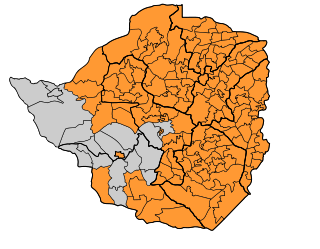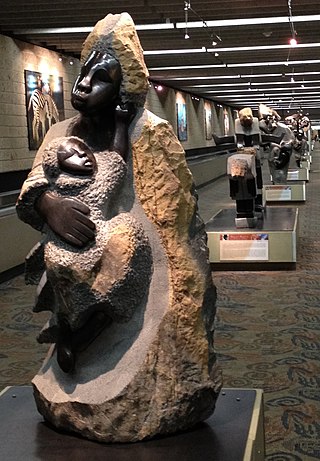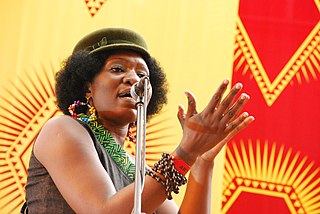Related Research Articles

Zimbabwe maintains relations with various countries around the world, and maintains close diplomatic relations with neighboring nations.

Harare, formerly known as Salisbury, is the capital and largest city of Zimbabwe.

Tsitsi Dangarembga is a Zimbabwean novelist, playwright and filmmaker. Her debut novel, Nervous Conditions (1988), which was the first to be published in English by a Black woman from Zimbabwe, was named by the BBC in 2018 as one of the top 100 books that have shaped the world. She has won other literary honours, including the Commonwealth Writers' Prize and the PEN Pinter Prize. In 2020, her novel This Mournable Body was shortlisted for the Booker Prize. In 2022, Dangarembga was convicted in a Zimbabwe court of inciting public violence, by displaying, on a public road, a placard asking for reform.

Christopher William Dell is a career United States Foreign Service officer who served as the U.S. Ambassador to Angola, Zimbabwe, and Kosovo.

United States–Zimbabwe relations are bilateral relations between Zimbabwe and the United States. Both countries share a common history and language as former British colonies.

The following outline is provided as an overview of and topical guide to Zimbabwe:

Hyperinflation in Zimbabwe is an ongoing period of currency instability in Zimbabwe which, using Cagan's definition of hyperinflation, began in February 2007. During the height of inflation from 2008 to 2009, it was difficult to measure Zimbabwe's hyperinflation because the government of Zimbabwe stopped filing official inflation statistics. However, Zimbabwe's peak month of inflation is estimated at 79.6 billion percent month-on-month, 89.7 sextillion percent year-on-year in mid-November 2008.

The 2008 Zimbabwean cholera outbreak was an epidemic of cholera affecting much of Zimbabwe from August 2008 until June 2009. The outbreak began in Chitungwiza in Harare Metropolitan Province in August 2008, then spread throughout the country so that by December 2008, cases were being reported in all 10 provinces. In December 2008, The Zimbabwean government declared the outbreak a national emergency and requested international aid. The outbreak peaked in January 2009 with 8,500 cases reported per week. Cholera cases from this outbreak were also reported in neighboring countries South Africa, Malawi, Botswana, Mozambique, and Zambia. With the help of international agencies, the outbreak was controlled, and by July 2009, after no cases had been reported for several weeks, the Zimbabwe Ministry of Health and Child Welfare declared the outbreak over. In total, 98,596 cases of cholera and 4,369 deaths were reported, making this the largest outbreak of cholera ever recorded in Zimbabwe. The large scale and severity of the outbreak has been attributed to poor sanitation, limited access to healthcare, and insufficient healthcare infrastructure throughout Zimbabwe.

Sculpture and in particular stone sculpture is an art for which Zimbabwe is well known around the world.
Hopewell Rugoho-Chin'ono is a Zimbabwean journalist. He has won numerous awards in journalism and has worked in both print and broadcasting journalism. He was a fellow at Harvard.
Nathalie Pownall is a British Actress and Film Maker.

Agnieszka Piotrowska is an author, academic and award-winning filmmaker, probably best known for her 2008 documentary Married to the Eiffel Tower, about women who fall in love with objects."

LaBrassBanda is a Bavarian brass band originating from Übersee, near Chiemsee, Bavaria, Germany. The name of the band is a portmanteau of the Italian words "la banda" and the English term "brass band", both meaning the same.
Brett Bailey is a playwright, artist, designer, play director, festival curator and the artistic director of the group Third World Bun Fight. He was the curator of South Africa's only public arts festival, Infecting the City, in Cape Town, South Africa, from 2008 until 2011. His works have played across Europe, Australia and Africa, and have won several awards, including a gold medal for design at the Prague Quadrennial (2007).

Prince Kudakwashe Musarurwa, was a Zimbabwean African jazz singer, songwriter, producer and musician.
Darius Mutamba, is a Zimbabwean conceptual visual artist, curator, journalist, and photojournalist. He is a journalist who has worked as a photojournalist for local news papers Daily News, Daily News on Sunday, and The Weekend Post. He also works as a production assistant for The Financial Gazette.

Mokoomba is a Zimbabwean musical group, originally from Chinotimba township, Victoria Falls, Zimbabwe. The group sings in a number of languages including English, Luvale, Tonga, Nyanja, Ndebele and Shona. Mokoomba takes its name from a Tonga word that connotes deep respect for the Zambezi river and the vibrant life along its banks.

Edith Katiji, known professionally as Edith WeUtonga, is a Zimbabwean Afro-jazz and traditional music artist, bass guitarist, songwriter, actress and music teacher. She was born in Kadoma, which lies approximately 166 kilometres (103 mi), by road, southwest of Harare. Being of Malawi origin and growing up in Bulawayo she sings in four different languages mainly Shona, Chichewa, Ndebele and English. Her band is called Utonga which means dawn. She is one of only a few bass guitarists in Zimbabwe who is also a lead vocalist for a band. She also plays the acoustic guitar, mbira and drums.

Victoria Wezi Mhone, known in music circles as Wezi or Wezi HeartSound, is a Zambian singer and songwriter. She rose to fame in 2016 after releasing her debut EP-Uhai which won her the 2016 new artist of the year at the Zambian Music Awards. Wezi released a song called "Isa Bantu Tyala" featuring Pilato and "Take My Heart", song cover, which was produced by Chali Bravo, released on 8 April 2020.
Charmaine Mujeri is a Zimbabwean actress. In 2020, she was nominated for best supporting actress at the Africa Movie Academy Awards.
References
- ↑ "Harare International Festival of the Arts (HIFA)". HIFA. Archived from the original on 26 June 2013. Retrieved 6 August 2019.
- ↑ "Zimbabwe festival diary". 24 April 2008 – via bbc.co.uk.
- ↑ "Seven days of fantasy in a city of crushing reality". 30 April 2008 – via The Guardian.
- ↑ "Mugabe's Zanu-PF loses majority". 3 April 2008 – via bbc.co.uk.